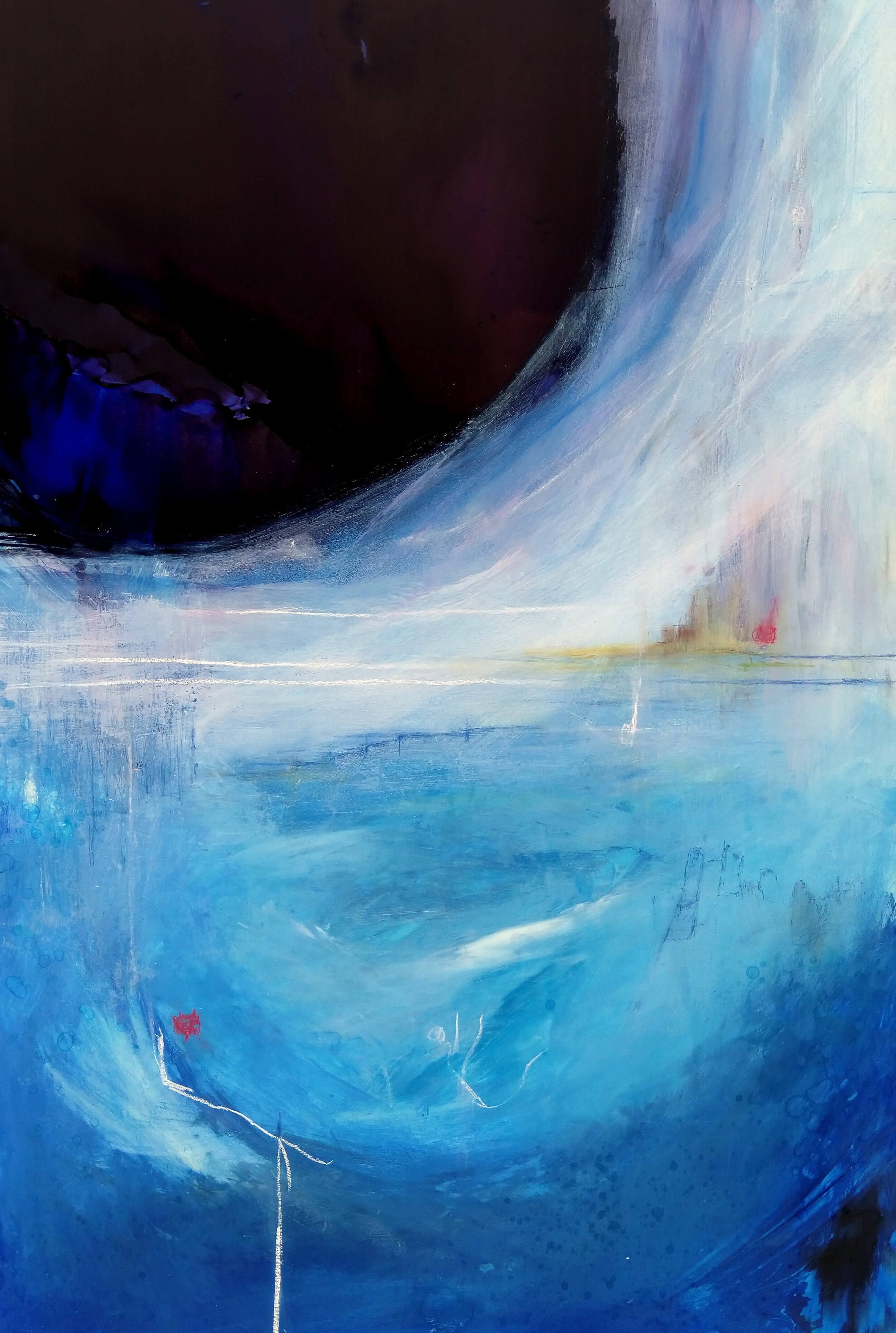SLEEP/WAKE
Pieces in the SLEEP/WAKE collection rely on time spent in the hypnagogic state—a lovely place between wakefulness and sleep. Inspired by Max Richter's composition "Sleep," and the music of Son Lux and Thom Yorke, these synesthetic paintings depict subconscious and abstract imagery.
THE PROCESS BEHIND the SLEEP WORKS
As a synesthetic artist, my process begins with a particular sound or some music that has captured my attention. Once I’ve discovered a song that is visually stunning, I'll play it on loop in the studio and I paint what I see, working until what’s on the canvas matches what I hear and the piece comes to life.
If, however, I'm not seeing a song as clearly as I'd like (perhaps other sounds were competing when I first heard it, or it's just a little out of focus), I'll bring it into my hypnagogic state. I’ll lie down in the dark with my headphones on, and let myself begin to fall asleep. I'll loop the song and watch as the synesthetic imagery becomes sharper, deeper, and more vivid. Because all other sensory distractions are gone, and my busy mind is turned "off" in the hypnogogic state the synesthetic photisms become beautifully clear.
Details from some SLEEP works.
HIBERNATING WITH MAX RICHTER’s ALBUM “SLEEP”
The “SLEEP” pieces were birthed during a season of hibernation. During the Christmas holidays, when the saccharine joy-agenda dredged up past loss and all of it was just too loud and painful, I purposefully made my world small and quiet and still. In this hibernation, the only music I was able to listen to was Max Richter’s hypnotic album "Sleep." This 8-hour composition is intended to be listened to as one sleeps through the night. Richter worked with neuroscientists to learn what the brain does during sleep, and curated his sounds to accompany various sleep states. He says about the composition, "For me, Sleep is an attempt to see how that space when your conscious mind is on holiday can be a place for music to live."
The effect of listening to this intriguing and sonically gorgeous music during a difficult season was two-fold. As I listened and slipped into the hypnogogic state, the hypnotic, sedative rhythms coaxed awake my soundly-sleeping grief so I could compassionately acknowledge it, and then its gentle beauty provided a balm and comfort for that pain. Hibernating is almost like death—so quiet, so dark and cold, so still. But the heartbeat is evidence of life. The work I'm creating in my SLEEP collection is that life poured out on canvas.
Listen to Max Richer’s album “Sleep.”
THE SLEEP WORKS
The paintings I create in response to the music of “Sleep” are dark and deep, but often have some subtle, soft light. The synesthetic imagery of this music is more abstract than usual, and somehow inside these images are landscapes in which I can walk and explore the subconscious hypnagogic state. As Max Richter intends his listeners to spend long, quiet stretches of time with “Sleep,” so I invite viewers of my SLEEP works to dwell and hibernate within the various spaces of each piece. Once inside, a place to bring one’s own grief might be found, perhaps even restoration.
Below is a sampling of completed SLEEP pieces. View the full collection here.
PATH 17 (CHAINS).
SPACE 17 (CHAINS).
SPACE 26 (EPICARDIUM).
SLEEP STUDY I.
SLEEP STUDY II.
SLEEP STUDY III.
WAKE
The WAKE pieces are a counterpart to all that is embodied in SLEEP. Referencing synesthetic images induced by the music of Son Lux, Thom Yorke, and more, these works are a resurrection to the sleep-death, redemption for grief and loss.
As spring slowly emerges from winter, and grief softens with time, so gradually have the WAKE works surfaced after SLEEP. The new marks, lines, and landscapes developed in SLEEP provide a new artistic vocabulary with which to express previously inaccessible sound imagery.
Often times, after choosing the music for a particular WAKE piece, I discovered the lyrics of the songs contain themes of wakening from sleep, or stepping from dark into light:
OUT OF THE DARK DAYS AND INTO THE BRIGHTER NIGHT
Awake, awake
This is a dream state
Though we were wide awake
Out of the dark day, into the brighter night
lyrics from Son Lux – Dream State
PLEASE LET ME KNOW WHEN YOU’VE HAD ENOUGH
Please let me know
When you’ve had enough
Of the white light
Of the dawn chorus
lyrics from Thom Yorke – Dawn Chorus
WAKE ME UP I’M STILL ALIVE
Wake me up, I’m still alive
lyrics from Son Lux's “Sleep”











